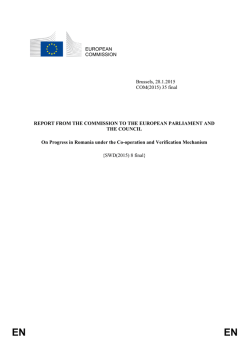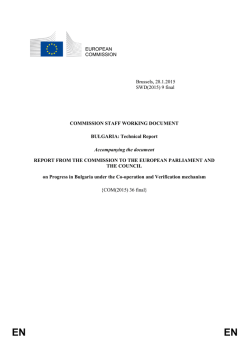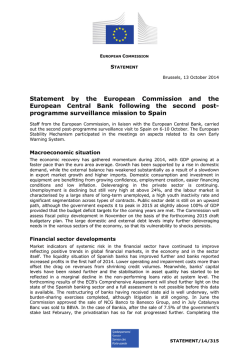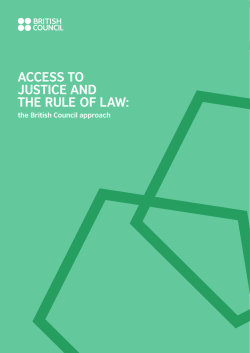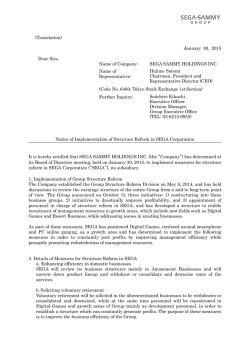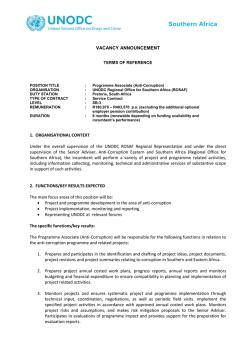
COM(2015)36 - European Commission
EUROPEAN
COMMISSION
Brussels, 28.1.2015
COM(2015) 36 final
REPORT FROM THE COMMISSION TO THE EUROPEAN PARLIAMENT AND
THE COUNCIL
On Progress in Bulgaria under the Co-operation and Verification Mechanism
{SWD(2015) 9 final}
EN
EN
1. INTRODUCTION
The Cooperation and Verification Mechanism (CVM) was set up at the accession of Bulgaria
to the European Union in 2007.1 It was agreed that further work was needed in key areas to
address shortcomings in judicial reform, the fight against corruption, and tackling organised
crime. Since then CVM reports have charted the progress made by Bulgaria and have sought
to help focus the efforts of the Bulgarian authorities through specific recommendations.
The CVM has played an important role in the consolidation of the rule of law in Bulgaria as a
key facet of European integration. Monitoring by the Commission and cooperating with the
work of the Bulgarian authorities to promote reform has had a concrete impact on the pace
and scale of reform. The Commission's conclusions and the methodology of the CVM have
consistently enjoyed the strong support of the Council,2 as well as benefiting from
cooperation and input from many Member States.
This report summarises the steps taken over the past year and provides recommendations for
the next steps. It is the result of a careful process of analysis by the Commission, drawing on
inputs from the Bulgarian authorities, civil society and other stakeholders. The Commission
was able to draw on the specific support of experts from the magistracy in other Member
States to offer a practitioner's point of view.
The political uncertainties of the past year in Bulgaria have not offered a stable platform for
action. This report will point to a number of areas where problems have been acknowledged
and where solutions are starting to be identified. These will need to take root for the
sustainability of change to be shown. Bulgaria can also do more to collect (and publish) data
on the judiciary and law enforcement.
The extent of the challenge has been illustrated by opinion polling of Bulgarians themselves.
A Eurobarometer taken in the autumn of 2014 showed a strong consensus in Bulgarian
society that judicial reform, the fight against corruption and tackling organised crime were
important problems for Bulgaria. The results also showed a concern amongst Bulgarians that
the situation had deteriorated, though with hope that this trend might reverse and with strong
support for an EU role in addressing these issues, and for EU action to continue until Bulgaria
had reached a standard comparable to other Member States.3 These attitudes underline that
continuation of the reforms is crucial for the quality of life of citizens, both because of the
impact of corruption and organised crime on the Bulgarian economy and because of the
importance of the rule of law for a functioning and free society.
The CVM is designed to monitor longer-term trends rather than take a snapshot of the
situation at a particular moment. However, this report seeks to take into account the
perspectives put in place by the government which took office in November 2014 and to
identify some key landmarks which can illuminate the progress of these policies in the future.
In this way, the Commission hopes this report will help in building a new consensus to
accelerate reform in Bulgaria. The recommendations set out in this report, well-targeted EU
1
2
3
Conclusions of the Council, 17 October 2006 (13339/06); Commission Decision establishing a
mechanism for cooperation and verification of progress in Bulgaria to address specific benchmarks in
the areas of judicial reform and the fight against corruption and organised crime, 13 December 2006 (C
(2006) 6570 final)
Council conclusions on previous reports: http://ec.europa.eu/cvm/key_documents_en.htm
Flash Eurobarometer 406
2
funds and the engagement of other Member States4 together show how the EU stands ready to
support a renewed effort.
2.
STATE OF THE REFORM PROCESS IN BULGARIA
2.1
Reform of the judiciary
Independence, accountability and integrity of the judiciary
The Supreme Judicial Council (SJC) has wide-ranging powers to manage and organise the
Bulgarian judicial system. The 2014 CVM report noted that despite some important steps in
terms of managerial reform, the SJC was not widely regarded as "an autonomous and
independent authority able to effectively defend the judiciary's independence vis-à-vis the
executive and parliamentary branches of government".5 The work of the SJC in 2014 has
continued to be subject to controversy, with several incidents in relation to appointments,
dismissals or the control of the application by courts of the system of random allocation of
cases. In addition to this, tensions between the SJC and its Civic Council, set up to represent
civil society, have developed over time, with claims on the part of civil society actors that
their views are not being adequately taken into account. Several organisations, including the
largest judges' association, have left the Civic Council as a result. Perhaps partly in reaction,
the SJC has developed its communication strategy and has taken some further steps in terms
of transparency.6
One issue raised by stakeholders linked to independence is the management of the two
branches of the magistracy by their peers. Different Member States have different degrees of
autonomy for judges and prosecutors within judicial councils. This has become an area of
debate in Bulgaria, with several calls for separate chambers within the SJC to determine
career and disciplinary decisions concerning judges and prosecutors, with more horizontal
issues being dealt with in plenary. The underlying reason for such calls is the different
organisational structures and roles of judges and prosecutors, but also the fact that decision
making on appointments and disciplinary matters could be used by one constituency of the
SJC to pressurise the other.
This idea of a change of the SJC structure has been taken over in the new proposal for a
judicial reform strategy adopted by the Bulgarian government and the Parliament.7 The SJC,
without fully opposing the change, has raised feasibility concerns, considering it would
require a change of the Constitution, and could not be enacted through a legislative
amendment of the Judicial System Act. In addition, the reform strategy touches upon wider
issues such as the election of SJC members. Previous CVM reports have already made
recommendations which would hold good for the SJC's next elections, to increase
transparency and address integrity in the selection procedure, including through "one judge
one vote" for the judicial quota of members of the Council.8 The new strategy also raises the
4
5
6
7
8
Some Member States provide technical assistance to Bulgaria in CVM-relevant areas.
COM(2014) 36 final, p.3
Technical report section 2.1
Reports suggest however that this issue was questioned in Parliament on 21 January 2015.
COM (2012) 411 final, p.11.
3
issue of reducing the power of court presidents, raised in the past as an important issue for the
independence of individual judges.
The importance of more transparency and objectivity in judicial appointments has been a
consistent theme in CVM reports.9 Although some of the peaks of controversy seen in 201213 were avoided in 2014, the question of high level appointments within the magistracy has
remained problematic. In particular, the election of the President of the Supreme Court of
Cassation (SCC) was postponed on several occasions, despite the fact that candidates with
good credentials had applied – with solid experience in the SCC itself – and amidst
controversy over the voting system. Nominations of administrative heads of other courts
raised concerns about the openness and merit-based nature of the selection procedure. In
addition to this, questions submitted to the SJC by NGOs concerning integrity issues of
certain candidates do not always seem to have been addressed, even though the SJC carries
out a formal integrity check of all candidates – an important part of the procedure since it can
lead to a negative opinion. Some procedural improvements have taken place which could lead
to greater transparency in the procedures, such as in particular the introduction of a possibility
for the judges at the SCC to organise a hearing of the candidates for President of the Court.
Such new procedural options can both enhance the credibility of appointments and improve
the ownership of rank and file judges in the process.
A key actor in promoting integrity and efficiency within the judiciary has always been the
Judicial Inspectorate. The election of its Chief Inspector, after a long vacancy of the position,
was considered as a test case by the January 2014 CVM Report.10 The election has so far not
yet taken place. The procedure in Spring 2014 attracted candidates who seemed well qualified
for the post, but a lengthy process meant that Parliament did not reach the stage of a vote. As
a result, the Inspectorate has remained without the strong independent leadership foreseen in
the Constitution. This will remain an important test case in 2015 of the ability of the
Bulgarian institutions to carry out transparent and merit-based appointments to high-level
offices in the judiciary.11
Another recommendation of the 2014 Report12 was a thorough and independent analysis of
the system of random allocation of cases, to ensure it is secure, and that administrative heads
of courts are made to account in full for any decision not to use random allocation. The SJC
has taken some steps to analyse potential vulnerabilities and drew up plans to modernise the
system in the context of a longer term e-Justice project. The allocations can now be collected
centrally, facilitating checks. However, this interim solution does not appear to have improved
security. Specific shortcomings identified in a March 2013 audit of the Supreme
Administrative Court and the Sofia City Court were not followed up. As a result, a series of
scandals concerning case allocation in the Sofia City Court broke out in autumn 2014.13 These
problems were not identified by the SJC – the issues had to be raised by outside actors.
9
10
11
12
13
See for example COM (2012) 411 final, p.6 and COM (2014) 36 final, p. 9.
COM (2014) 36 final, p.4.
The National Assembly has re-started the procedure with a deadline for nomination of candidates on 30
January 2015.
See Recommendation p. 9 of COM (2014) 36 final.
Notably in relation to the allocation of bankruptcy procedures in two emblematic cases. See technical
report section 4.1.
4
Whilst delays in the preparations for a longer-term solution are unfortunate, the more
important issue is the reaction to evidence of transgressions. The reaction of the SJC in
autumn 2014 suggested that this is a low priority for the Council, in spite of the potential for
criminal as well as disciplinary offences. It seems likely that the reputation of the judiciary in
Bulgaria will continue to be damaged until a fully secure system is in place. Using external IT
security expertise to test the new system would help to reassure that this is on the right track.14
Reform strategies for the judicial system
Steps have been taken by the Ministry of Justice with first the roadmap for addressing the
2014 CVM recommendations (although its current status and deadlines are to be clarified) and
then in the autumn with the presentation of a long awaited judicial reform strategy.15 This
comprehensive document would replace the 2010 strategy, which has been only partially
implemented. The Strategy was adopted by Decision of the Council of Ministers on 17
December 2014 and broadly endorsed by Parliament on 21 January 2015.16
Consensus and ownership has been pursued by encouraging a debate on the text.17 The
Prosecutor-General and the SJC have reacted in detail. The text includes many elements
called for by civil society and professional organisations,18 and indeed points raised by
previous CVM reports. Its goals are to ensure the good governance of the judicial authorities
and improve human resource aspects, but also more broadly to modernise criminal policy and
improve the protection of fundamental rights. The strategy has introduced a degree of clarity
and urgency into the debate on judicial reform – this will now need to be carried through into
implementation.
From the side of the prosecution, there has been significant progress with the implementation
of the action plan put forward by the Prosecutor-General in 2013. Partly sparked by the
judicial reform strategy, the Prosecutor-General also made new proposals in November 2014
for the decentralisation of the prosecution and for providing additional guarantees of noninterference in the work of prosecutors.19
Work on a new criminal code has progressed, but still lacks a consensus. Experts and
practitioners have expressed divergent views about whether a complete rewrite is needed, or
just amendments – and about the overall rationale. The current intention seems to be to follow
a two track approach, with a first stage consisting of swift amendment of parts of the criminal
code (and possibly of the criminal procedure code) on certain more urgent issues, including
provisions related to the fight against corruption and organised crime. In a second stage and
on the basis of thorough impact assessment and public consultation, the need for a new
14
15
16
17
18
19
This could be expected to be a good area for the support of EU funds.
Available on the website of the Ministry of Justice (in Bulgarian): http://mjs.bg/107/
It appears that some elements of the strategy were questioned in Parliament.
Under the interim government in October 2014, the text was put forward as a draft.
See most notably the above-mentioned proposals for a division of the SJC into chambers for decisions
concerning appointments and disciplinary matters.
The concrete proposals presented by the Prosecutor-General, aiming at a more decentralised,
transparent and accountable prosecution office, could also be considered in the context of broader
changes to the Criminal Procedure Code and the Judicial Systems Act.
5
criminal code would be determined. This could be part of a broader reflection on future
criminal policies, which needs time in order to build consensus.20
Efficiency of the judicial system
Work has continued within the SJC on a methodology for the assessment of the workload of
magistrates and judicial bodies.21 One of the goals is to set up rules on how to measure and
allocate workload, taking into account the complexity as well as the scale of cases.
Differences in the workload today are seen as a significant cause of inefficiency in the system.
All regional courts will be reviewed, taking into account socio-economic as well as
demographic factors and the imperative of guaranteeing access to justice, with a view to
presenting a proposal for a new judicial map for the regional courts before the end of 2015.
There have already been concrete steps taken in rationalising military courts. A solid
methodology would offer the right basis to assess whether it is justified to close down courts
with very little workload (or instituting a system of "mobile courts"), while redistributing
resources towards other overburdened courts. Work on a broader reform of the judicial map is
likely to take longer, notably as the SJC would need to coordinate with a wider range of
stakeholders,22 even if the final decision rests with the SJC.
In terms of broader human resource management, appraisal and promotion systems as well as
the quality of training are key factors. Here the Government's judicial reform strategy sets out
some elements for future improvements. The National Institute of Justice continues to develop
its repertoire of training for judges.23
Disciplinary action has been another area highlighted in CVM reports. Problems have
included a lack of consistency (and clear standards to deliver this), with a high proportion of
decisions being overturned in appeal. The SJC has recently adopted some steps including
general guidelines in this area, though this does not appear to have been based on a clear
analysis of shortcomings. It is too early to say if the measures taken will be sufficient to avoid
continued controversy over disciplinary proceedings in the future.
Another issue which CVM reports have urged to address is the effective implementation of
court judgements and notably the problem of convicted criminals having been able to escape
justice and abscond. Some work has been done, and some managerial steps followed through
an interagency action plan for 2014. However, the response of the authorities continues to
lack conviction. The issue has not been looked at comprehensively, so it is difficult to assess
the extent to which one-off measures (such as the use of electronic monitoring) will fill the
gaps.24
20
21
22
23
24
The preparations that have been ongoing since 2009 in this area should provide a rich basis in terms of
analytical input.
Partly in response to CVM recommendations (see for example COM(2014) 36 final, p.10), the
analytical work which is currently being carried out within the SJC could also further improve the basis
for assessments, for example by better accounting for workload and developing a clearer basis for the
regular appraisal of magistrates.
There are implications for the territorial organisation of other public services.
Technical report, section 4.2.
See technical report, section 6.2.
6
2.2
Corruption
Corruption remains a serious issue in Bulgaria. In the recent Eurobarometer survey, almost all
respondents identified corruption (97%) as an important problem.25
It has been a long standing recommendation of the CVM that Bulgaria reviews and updates its
national anti-corruption strategy.26 The first informal results of a recent evaluation of the
impact over past years of the Bulgarian anti-corruption strategy, carried out by the Bulgarian
authorities, appears to constitute an important contribution in terms of an honest assessment
of the shortcomings of the strategy. These include a piecemeal approach, the insufficient use
of risk assessments, and an absence of monitoring and evaluation. Though ministerial
inspectorates have developed a culture of improved control, the absence of a centralised
structure or common benchmarks results in different ministerial inspectorates acting in an
uncoordinated way. Arrangements at local level seem to show major gaps. As for the structure
assigned by Bulgaria to perform risk analysis (BORKOR), this does not seem to have
delivered results in proportion to its costs, and in any event can only be seen as providing
analytical input. This body is not designed to provide political direction.27
This assessment of the shortcomings of the current anti-corruption system could be the
starting point of a long-awaited reform. A consultation of all stakeholders would allow
experience to be taken into account and build ownership for the exercise. Civil society has
developed useful experience in the field of anti-corruption, which should be used to the full.
Preventive measures seem in their infancy in most cases. Some lessons have been learned in
particular areas,28 but these reflect piecemeal efforts. There is no evidence of a structure to
exchange best practice or to give credit to successes. The public administration does not have
a comprehensive system of compulsory monitoring of anti-corruption activities and reporting
to a central point.
As set out in successive CVM reports, public procurement is a high risk area in terms of
corruption. Systems to check the procedures can be strengthened, in line with the recent
strategy for the Bulgarian public procurement system which has been developed in response
to recommendations from the Commission services.
Regarding conflicts of interest and illicit enrichment, the Commission on the Prevention and
the Ascertainment of Conflicts of Interest (CPACI) has been awaiting legislative changes as
well as nominations at managerial level. Both are important to the effective operation of the
Commission,29 and the forced resignation of the former Chairman following evidence of
trading in influence30 would suggest there is a degree of urgency to put the Commission back
on a sound footing. However, these decisions have now been pending throughout 2014. This
is the responsibility of Parliament, and the delays run the risk of increasing the impression
25
26
27
28
29
30
Flash Eurobarometer 406
Similarly, the EU Anti-Corruption Report 2014 highlighted a number of challenges in Bulgaria (COM
(2014) 38 final). Corruption (as well as judicial independence) are also noted as challenges for Bulgaria
in the 2014 country specific recommendations in the context of the European Semester of economic
policy coordination. (OJ 2014/C 247/02).
COM(2014) 36 final, p. 7; technical report section 5.4.
Such as avoiding the handling of cash by customs officers and border guards, or rotating staff.
Technical report section 5.4.
This has been the subject of criminal proceedings.
7
that decisions where integrity concerns should predominate are being taken on political
grounds. In terms of corruption prevention, a better use might be made of asset declarations
submitted by public officials in terms of identifying risk areas and possible cases of illicit
enrichment.
Effective prosecution and final convictions are central to the credibility of any anti-corruption
strategy. There are so far very few final convictions in cases involving substantial corruption,
despite the scale of the problem.31 Positive steps have been taken in the General Prosecution
to prioritise corruption, and there has been an increase in the number of cases initiated and the
speed with which they progress. A few of these cases concern individuals in high-level
positions. As in the case of organised crime, monitoring of the evolution of corruption cases at
court level is essential to identify aspects of court practice which can be manipulated to delay
the course of justice. Cases sometimes appear to stall for a substantial amount of time at court
level before being sent back to the prosecution with a short deadline to perform
supplementary tasks.
A small specialised structure has been put in place by the Prosecution, staffed by prosecutors
and investigators from the State Agency for National Security (SANS), to more effectively
investigate corruption in the public administration. The unit has so far mostly been targeting
cases of local corruption, which could not be handled at local level given local relationships
and pressures. The model of specialised structures to fight corruption appears to have seen
some early results, but the test will come with more high level cases and a development of
operational capacities. It will also be important that structural changes to SANS do not
undermine the effectiveness of this work.
Another problem appears to lie with deficiencies in rules in the Criminal Code to fight
corruption, and in particular "high-level corruption", trading in influence and the
differentiation of active and passive corruption. There seems to be an acute need to modernise
the Code in this area, which could benefit from rapid amendments, in parallel to a broader
reflection on criminal policy and a new code.
2.3
Organised crime
Organised crime remains a problem in Bulgaria. This is recognised in public attitudes,32 and
high-profile recent cases of public shootings and the murder of a witness have provided a
clear reminder of the severity of the situation. Whilst the number of cases initiated by the
prosecution seems to have increased substantially in 2014, the number of cases that have
reached final conclusion remains low.33 Authorities working in this area have reported to the
Commission concerns over pressures at local level hampering effective investigation of crime
and corruption. The intimidation of witnesses remains a serious problem, and there may be
ways to encourage witnesses to accept more readily witness protection programmes.34
31
32
33
34
SANS' report on its activities for 2014 was able to point to much more activity on organised crime than
on anti-corruption.
It is perceived as an important problem by 96% of Bulgarian citizen surveyed in the recent Flash
Eurobarometer 406.
Technical report section 6.1.
In a recent case of the murder of a witness in an emblematic case, the witness has declined to participate
in a witness protection programme.
8
The specialised prosecution and court put in place two years ago are slowly starting to yield
some results, with a few final convictions, and some evidence of swifter procedures. But their
action remains hindered by an unfocussed attribution of tasks and very formalistic provisions
of the Criminal Procedure Code. The Prosecutor-General made proposals in November to
address some of these issues.
Despite substantial efforts, asset forfeiture and confiscation still do not seem sufficiently
targeted against organised crime groups. Interim freezing measures are ordered by the
Prosecution when urgent and passed on to the Assets Forfeiture Commission. This
Commission continues to achieve significant results, in spite of a burdensome legal
framework. The last CVM report noted question marks with regard to the new legal
framework for asset forfeiture35 – these issues remain outstanding.
The Ministry of Interior has own capacities for forensic, DNA, ballistic and graphology, but
other fields of expertise require using experts accredited to courts, raising questions of
availability, competence, costs and – possibly – impartiality. Bulgaria does not have a bureau
of experts or similar mechanism. Observers have raised this issue as one potential reason for
the failure of cases to progress in court.36
The new Bulgarian government has announced its intention to remove the investigation of
organised crime from the mandate of the SANS, reversing the controversial merger of the
former police directorate on organised crime – GDBOP – with SANS in 2013.37 The previous
reform in this area resulted in several months of operational disruption in organised crime
cases, including in cooperation with other Member States' security services. Concerns have
been expressed that a new reorganisation of the services responsible for investigating
organised crime risks similar disruption, but the government has made clear that it is
conscious of this risk and will take measures to facilitate the transition.
3.
CONCLUSIONS AND RECOMMENDATIONS
Since the Commission's last report in January 2014, progress in terms of addressing judicial
reform and making concrete advances on corruption and organised crime has been slow. The
fact that the period covered by this report saw three different governments and a deadlocked
parliamentary situation has clearly contributed to a lack of resolve to reform. However, the
foundation stone for taking reform forward is to acknowledge the problems and identify
measures to remedy them. The current government has taken an important step by adopting a
judicial reform strategy with an impressive level of precision. There are also indications that
the forthcoming analysis of the existing anti-corruption measures will provide a helpful input
to reflections on a future strategy. The next phase would be to show that reform is genuinely a
political priority by rapidly taking these frameworks forward, building consensus and
identifying precise actions with specific milestones – and then to ensure their implementation.
This would require a further change in political culture, and a real sense that these issues are
at the top of the agenda.
35
36
37
COM (2014) 35 final, p.8
Technical report section 6.1.
COM (2014) 35 final, p.8
9
Some of the key institutions have continued to develop managerial changes which should
support the effort to carry reform through into change on the ground. In addition to
accelerating reform in line with the strategy, more systematic and professional gathering of
data, and more transparency about putting information in the public domain, would also help
build confidence in the professionalism and commitment of the authorities.
The credibility of progress will also depend on the reaction to specific controversies and on
progress in respect of specific cases. Past CVM reports have noted how public scepticism
about reform has been fuelled by controversy in areas like transparency and merit in judicial
appointments, or the reaction to transgressions like the absconding of convicted criminals or
evident failures in random case allocation. The Bulgarian authorities' reactions in such cases
continue to lack conviction, fuelling doubts about judicial independence. It remains the case
that the number of final court judgments on high-level corruption and organised crime cases is
very low. These shortcomings in terms of the key measures of change also lie at the heart of
Bulgarians' scepticism about reform so far, as shown by opinion polling.38
The Commission invites Bulgaria to take action in the following areas:
1. Independence, accountability and integrity of the judiciary
The judicial reform strategy includes many proposals designed to address weaknesses in this
area. Such measures need to be backed up with an awareness that the credibility of the system
relies on the authorities showing a determination to maximise objectivity and to ensure that
transgressions are handled robustly.
•
•
•
•
Pursue reform of the organisation of the SJC, involving the professional associations and
other relevant stakeholders, including looking ahead to procedures for the next elections
to the SJC which will deliver an SJC which can command confidence;
Apply objective standards of merit, integrity and transparency to appointments within the
judiciary, including for high level offices, and make these appointments in a timely
manner. Integrity issues are of particular importance and those responsible for
appointments have to show that any questions have been followed up;
Swiftly resolve the impasse on the nomination for the post of Chief Inspector;
Improve rapidly the security of the system of random allocation of cases and accelerate
ongoing work on its modernisation; perform rigorous and impartial investigations into all
cases where suspicions of possible tampering with the system are raised.
2. Reform of the Judicial System
The judicial reform strategy constitutes a solid basis for future action and the debate it has
sparked has shown bodies like the General Prosecution making a constructive response.
•
•
•
38
Implement the new judicial strategy as adopted by the government, as well as the detailed
ideas proposed by the prosecution;
Address the critical areas in the criminal code which need urgent improvement to
improve the fight against corruption and organised crime;
Agree on a detailed timeframe for longer term reflection on the fundamental goals of a
new criminal code.
Flash Eurobarometer 406.
10
3. Efficiency of the judicial system
The Supreme Judicial Council has been taking some important managerial steps which now
need to be followed through.
•
•
•
•
Complete the methodology for the assessment of workload of magistrates and courts and
consult all key stakeholders to offer an objective basis for the reform of the judicial map
(if necessary, disassociating the courts from other public service maps);
Enforce clear procedures and standards for penalties to ensure consistent disciplinary
rulings;
Implement work to close loopholes in the effective implementation of court decisions,
such as absconding to evade prison sentences or failure to apply financial sanctions
defined in court.
Make concrete progress on e-justice as a mean to improve the judicial process.
4. Corruption
The forthcoming evaluation of Bulgaria's anti-corruption strategy should provide a useful
analysis of the challenges facing Bulgaria. It can help both in defining a new strategy and in
starting concrete steps to begin to tackle the problems, both in terms of prevention and
effective prosecution.
•
•
•
•
•
•
•
Entrust a single institution with the authority and autonomy needed to coordinate and
control the enforcement of the anti-corruption activities; create a uniform set of
minimum standards for the public sector in terms of control bodies, risk assessment and
reporting obligations;
Put in place a solid national anti-corruption strategy, starting with publication of the
analysis of the shortcomings of the current strategy;
Ensure a determined follow-up to the public procurement strategy adopted in July 2014;
Finalise the nomination procedures for the remaining members of the CPACI and the
legislative changes to the conflicts of interest law;
Assess how the system of assets declarations can be put to a better use (such as targeting
checks through risk assessment);
Reinforce the capacity of the prosecution to pursue high-level corruption cases;
Monitor the progress of high level corruption cases and define and take steps to avoid the
exploitation of procedural loopholes to delay the process of justice.
5. Organised crime
It remains the case that the large number of outstanding cases and the few examples of
progress cast a shadow over work to address organised crime and to improve the
professionalism of law enforcement in this area.
•
•
Create the necessary conditions for the Specialised Court for Organised Crime and the
attached Prosecutor's Office to be able to concentrate on high profile, complex cases;
Monitor the progress of high level organised crime cases and define and take steps to
avoid the exploitation of procedural loopholes to delay the process of justice;
11
•
•
Ensure that necessary safeguards are taken to prevent high-level defendants absconding
from justice or managing to hide criminally acquired property before a final court
decision, with a clear assignment of the responsibility for any failings;
Ensure that any changes to the structures involved in the investigation of organised crime
are carried out in such a manner as to ensure operational continuity.
12
© Copyright 2026
